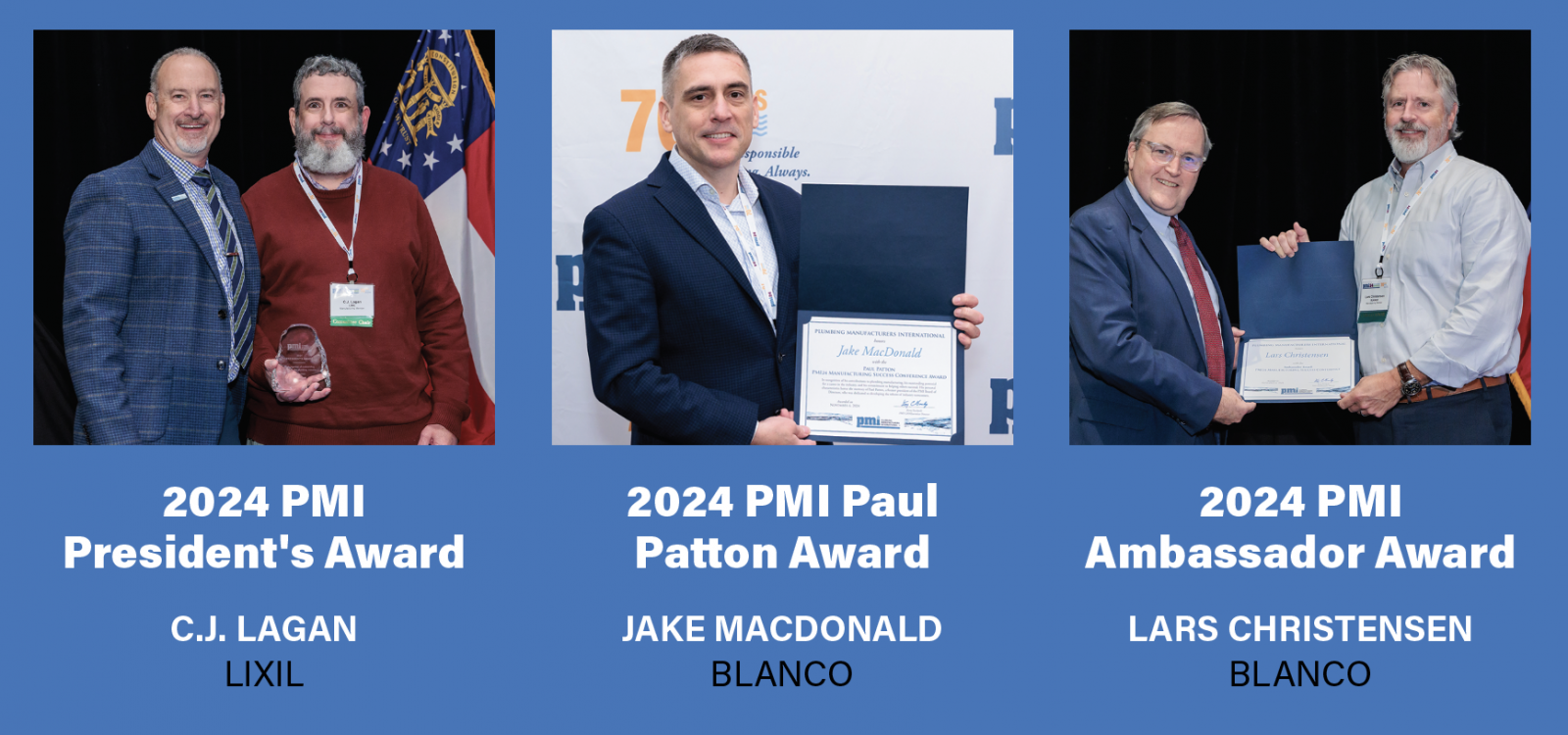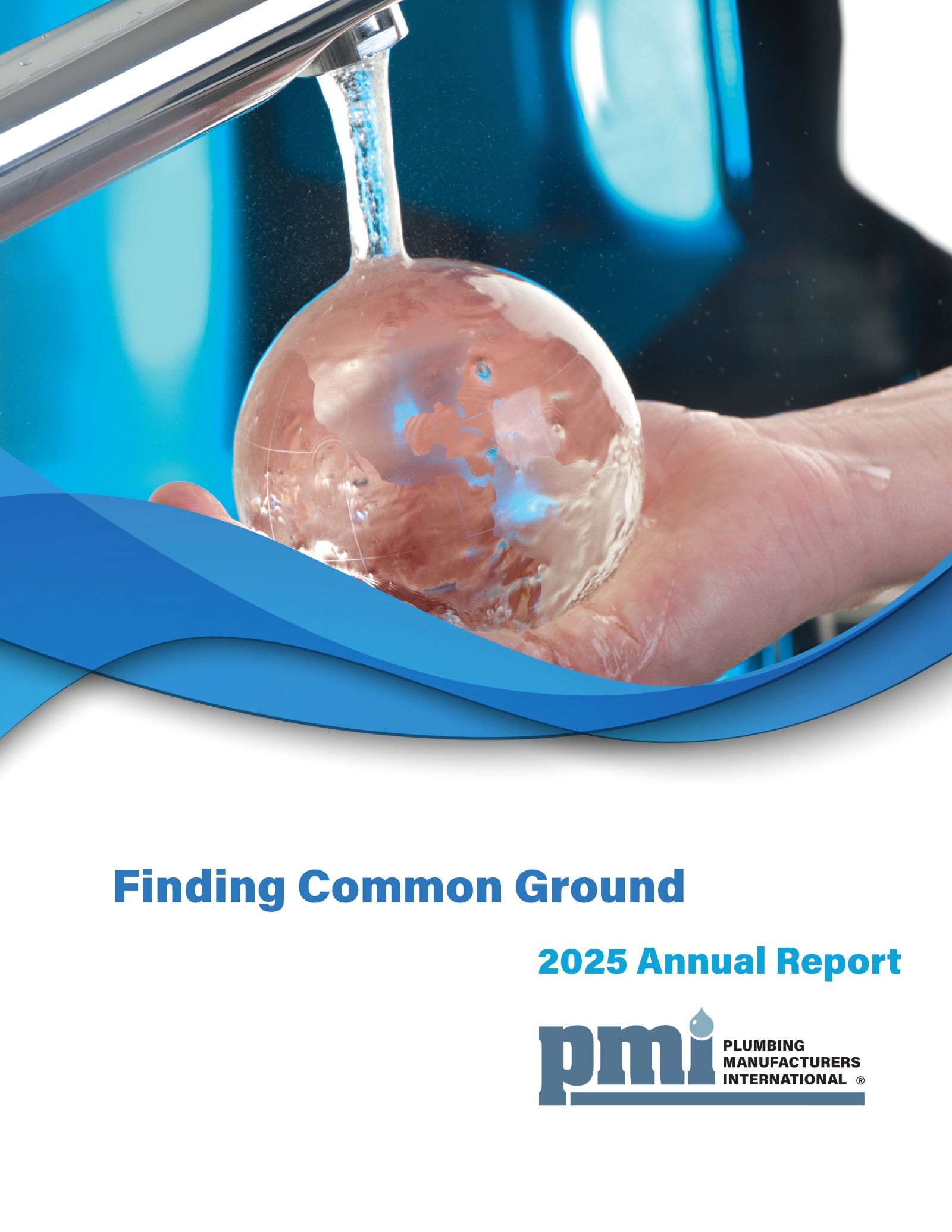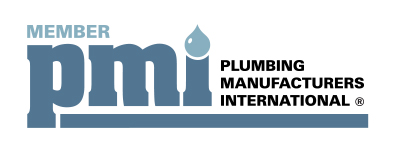
Finding Solutions for the Collective Good
Once again, Plumbing Manufacturers International and its members find themselves in the position of proactively finding sensible common ground as debates about the critical issues of the day swirl around us. Our role as mediator is not new to us. Over the years, we have learned that participating in the debate is more productive than fighting or fleeing it. Our responsibility to our customers, business partners, and ourselves is to stay relevant, trustworthy, and in the room where decisions happen.
PMI first began establishing this business posture when the debates leading up to the Energy Policy Act (EPAct) of 1994 and the establishment of the WaterSense program in 2006 were occurring. At these key moments in plumbing manufacturing history, PMI and its members realized that, by contributing to solutions rather than by being simply opposed to proposed actions, they would be valuable to the powers that be. By gaining a seat at the table while the EPAct and WaterSense were being developed, PMI and its members helped to establish harmonized federal water-efficiency standards and specifications and mitigated the adverse effects created by the patchwork of state regulations.
Today, as those standards and specifications are called into question and our industry grapples with the inflationary effects of tariffs, PMI again finds itself at a crossroads—whether to oppose what is happening or to participate in the process of finding a sensible common ground. We choose to be proactive and find common ground.
This year’s annual report again demonstrates the ability of PMI and its members to develop sensible and valuable solutions to many of the challenges facing our society, no matter what the government policies are. Our members continue to build bridges to prosperity through free trade, to make water a sustainable resource, to foster productive and diverse workplaces, to extend innovation into all aspects of business operations, and to fulfill public health and safety responsibilities.
By contributing scientific data and common sense to all discussions, we have earned a reputation among federal and state policymakers, peer industry groups, and the media as a credible and trustworthy voice. The examples we share in this report bear this out.
Sincerely,
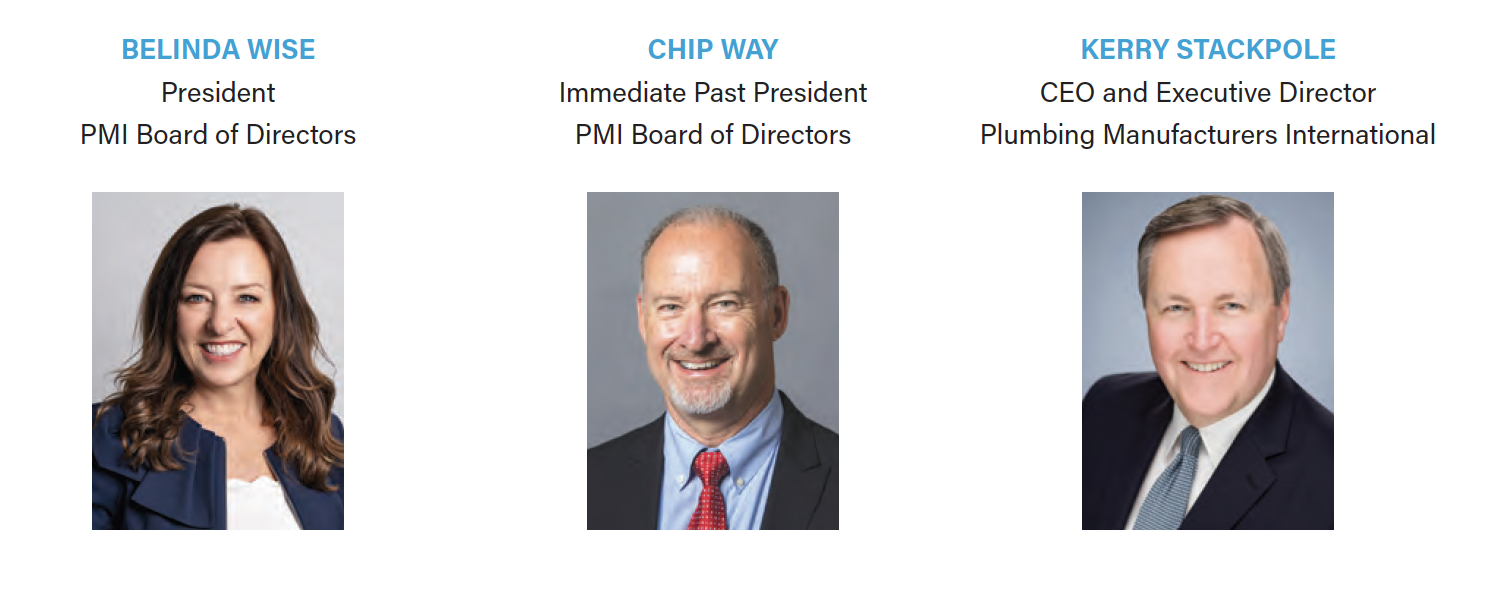

Free trade builds bridges to worldwide prosperity
Free trade is about finding the win/win among nations, about finding the common ground. Long before President Donald Trump began to use increased tariffs on foreign goods as a bargaining chip this year, Plumbing Manufacturers International’s members were increasing manufacturing capacity both inside and outside the United States and redirecting supply chains to be more reliable and cost-efficient. This dynamic occurred primarily due to the COVID pandemic and tax legislation.
The COVID pandemic forced many U.S. manufacturers to diversify their supply chains after disruptions to deliveries caused production delays. Over time, manufacturers became more adept at managing risks and diversifying options with suppliers both here and abroad.
Tax legislation passed in 2017 under the Trump administration allowed 100% bonus depreciation, which enabled manufacturers to deduct the entire cost of machinery in the same year it was purchased. Many companies, including plumbing manufacturers, with cash on hand decided to reduce their tax liability by building up their manufacturing capacity, according to an Axios article, “The tariff tailwinds behind a manufacturing rebound.” The depreciation ramped down to 80% for 2023 and 60% for 2024 but was permanently restored to 100% starting on Jan. 20, 2025, by the recently signed federal budget reconciliation bill. PMI and its members successfully advocated for the extension of this tax-favorable measure.

Tariffs hinder the global benefits of free trade
Because of the buildup of manufacturing capacity, some American manufacturers will benefit from tariffs that will incentivize production to occur in the U.S., the Axios article states. But many more manufacturers require materials and components from outside the U.S. and tariffs will increase their costs. As a global industry, plumbing manufacturing needs free trade to operate efficiently and optimally. And, as always, PMI and its members seek to find common ground on a highly charged issue.
PMI continues to participate in Americans for Free Trade, a coalition of more than 150 trade associations, to address tariff-related issues and actively lobbies on Capitol Hill and to Trump administration officials in support of free trade. PMI CEO/Executive Director Kerry Stackpole testified in person before the International Trade Commission in opposition to tariff proposals. “Dozens of plumbing products have been impacted by the tariffs on China and other nations,” he stated. “They continue to serve as a hidden tax on U.S. consumers, hurting domestic producers, retailers, and customers alike, and are having a negative impact on the U.S. economy.”
PMI Strategic Advisory Council member Bob Downie, the CEO of Duravit America, spoke to the importance of global free trade. “We need to leverage our assets in each part of the world for component purposes and manufacturing efficiencies,” he stated. “It’s extremely important that we use countries in each part of the world to create innovations or readily available product.”
Belinda Wise, PMI Board of Directors president and Neoperl US board member, said, “Fair trade is what we all hope for and believe in, and all PMI member companies have worked hard to support this. I’m proud to be in an industry in which companies gather data, analyze facts, and consider the implications about where to build a factory or from what supplier they will source materials. Our companies take great care in making these decisions, always mindful of fair trade principles. Our government must understand that we do our due diligence in this respect.”
To help PMI member companies navigate through the winds of change caused by tariffs, tax policy, and other economic factors, PMI Market Outlook LIVE quarterly presentations from ITR Economics provide reliable data upon which to base business decisions. Each quarter, companies receive snapshots of economic performance on various measures. Previews of what’s likely to occur next have achieved an impressive track record for accuracy usually in the range of 95-99%. In addition, recent PMI webinars have addressed topics including environmental product declarations, extended producer responsibility, the Federal Communications Commission’s new IoT Cybersecurity Labeling Program, the Safe Drinking Water Act and Lead and Copper Rule, and tariffs.
Plumbing manufacturing industry gains favorable media coverage and public sentiment
In the wake of Trump administration announcements about tariffs and water-efficient plumbing products, the plumbing manufacturing industry achieved favorable coverage from Consumer Reports, Bloomberg Opinion, and Slate magazine, as well as from various plumbing and water trade media.
The first Consumer Reports article states that their lab test results show that water-efficient toilets don’t sacrifice flushing performance and can save customers money. “Water-efficient toilets have been around for 30 years,” said Katy Halevah, who leads testing for the dozens of models in CR’s toilet ratings. And they’ve been reliable for just as long, the article says. The second article—featuring Stackpole and information from PMI about how to buy high quality fixtures and fittings—warns consumers about the dangers of using counterfeit and non-certified contraband faucets and plumbing products.
The Bloomberg Opinion article notes the direct economic impact of the plumbing manufacturing industry—more than 200,000 jobs in 41 states and $13 billion in wages, according to the Plumbing Manufacturing Industry Economic Impact Study—and how the industry would be negatively affected by tariffs.
The Slate article also quotes Stackpole, along with individuals from TOTO USA and Kohler, and casts a favorable light on the Environmental Protection Agency’s WaterSense Program, PMI’s Rethink Water legacy product replacement initiative, and other industry accomplishments. Writer Anna Gibbs sums it up: “The evolution of the toilet is a success story that, against all odds, has brought us an efficient, affordable, and high-performing consumer good. And it’s hard to flush that kind of progress away.”

Water-efficiency is a fundamental aspect of sustainability
Having established itself as a trustworthy maker of kitchen and bath products, the plumbing manufacturing industry is now increasingly turning its attention to a broader set of challenges pertaining to water, sanitation and sustainability.
An example of this broadened focus is PMI’s landmark collaboration with global bathroom industry trade bodies in support of the ambitious commitments outlined in the newly signed Windsor Declaration. Led by supporting organizations Bathroom Association in the United Kingdom and by PMI, the National Kitchen and Bath Association, IAPMO and the International Code Council in North America, the declaration outlines a commitment to improve water efficiency, reduce infection risks, and advance global sanitation. This pioneering initiative emphasizes the need for responsible manufacturing, public education, and regulatory alignment to make meaningful strides toward sustainability in bathroom products. The declaration was signed by these PMI members on behalf of their companies: Matt Oakley, Duravit; Stuart Cronie, Fluidmaster; Cheri Phyfer, Fortune Brands Innovations; Hans Juergen Kalmbach, Hansgrohe; John Watson, IAPMO; Dominic Sims, International Code Council; Laura Kohler, Kohler; Emma Foster, Kohler Mira; Erin McCusker, LIXIL; and Fernando Fernandez, TOTO; as well as by individuals from various other companies.

Tom Reynolds, chief executive of the Bathroom Association, stated, “The Windsor Declaration represents a united front within our industry to tackle the critical issues of water scarcity and sanitation. We believe that by pooling our resources, knowledge and influence, we can inspire real change and support the global transition to more sustainable water management practices.”
Rethink Water addresses importance of safe and efficient plumbing systems
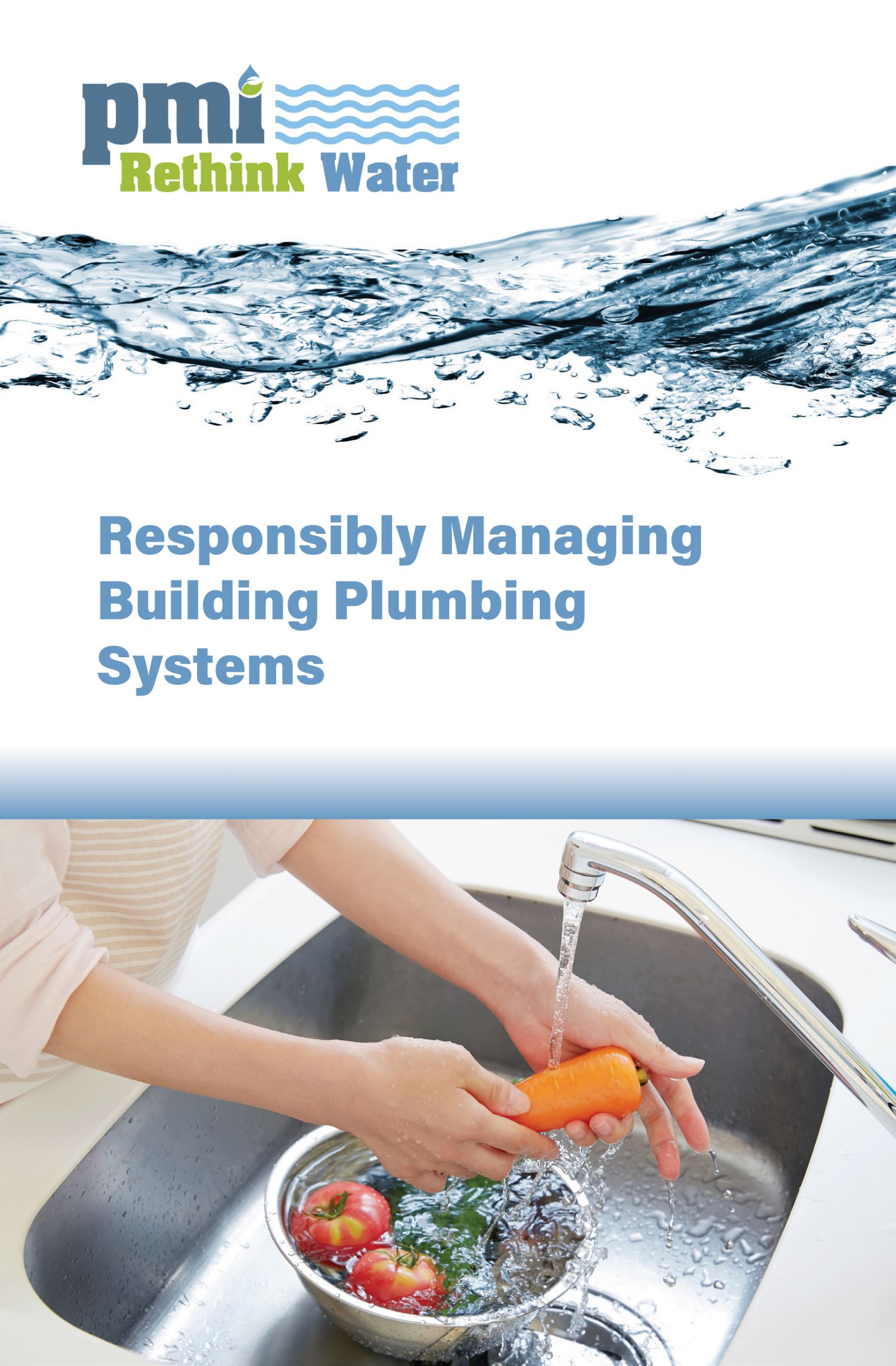 Reflecting on the importance of this international alliance, Stackpole highlighted PMI’s ongoing Rethink Water initiative, stating, “The Rethink Water initiative has been a cornerstone of our commitment to promote water conservation and efficiency across North America. The Windsor Declaration allows us to take that mission globally, uniting industry voices around the world to rethink how we manage water and make sustainable choices accessible to consumers everywhere. Together, we can influence regulatory frameworks, share best practices, and drive public awareness to benefit both our industry and the planet.”
Reflecting on the importance of this international alliance, Stackpole highlighted PMI’s ongoing Rethink Water initiative, stating, “The Rethink Water initiative has been a cornerstone of our commitment to promote water conservation and efficiency across North America. The Windsor Declaration allows us to take that mission globally, uniting industry voices around the world to rethink how we manage water and make sustainable choices accessible to consumers everywhere. Together, we can influence regulatory frameworks, share best practices, and drive public awareness to benefit both our industry and the planet.”
In a recently introduced Rethink Water chapter, PMI addresses the importance of “Responsibly Managing Building Plumbing Systems.” New website content featuring a video explains how these systems consist of many parts, including pipes, valves, water heaters, fixtures and fittings, pumps and drains. In well-engineered systems, these components work together to achieve the safe and efficient flow of water.
Stackpole said the content was developed to help policymakers understand how a change to one part of the system affects the other parts. “With good intentions toward saving water, policymakers in California and elsewhere want to reduce flow and flush rates below performance-tested WaterSense specifications certified by the Environmental Protection Agency,” he explained. However, further reducing these rates may have unintended, negative consequences to other plumbing system components, making them not work as well as planned.
PMI Advocacy/Government Affairs continually represents industry interests
On a day-to-day basis in the U.S., PMI’s advocacy/government affairs effort continues to advocate for WaterSense Program funding, for keeping federal water-efficiency standards established by the 1992 Energy Policy Act, for federal investment in plumbing research, and for exempting rebates for water-efficient product purchases from taxable income. Strengthening PMI’s government affairs efforts this year were the additions of Mike Johnson of Delta Faucet Company as the PMI Advocacy/Government Affairs Committee co-chair and Matthew Windrum as PMI’s director of state government affairs, policy and advocacy. Each year, PMI legislative forum and fly-ins in Washington, D.C., and Sacramento, California, provide PMI members with the opportunity to provide their viewpoints on critical issues to policymakers. And regular meetings of the PMI Technical Committee and PMI Advocacy/Government Affairs Committee provide forums for PMI member input and information gathering.
In yet another advocacy/government affairs effort, PMI collaborated with its members, government agencies, and online retailers to protect plumbing manufacturers’ brand value by warning the public about counterfeit and contraband plumbing products. During his May 14, 2025, testimony to the U.S. Senate Subcommittee on Intellectual Property covered by NBC News, Aaron Bores of Moen, a part of Fortune Brands Innovations, asked the federal government to close loopholes that allow the sale of counterfeit faucets. Moen worked with IAPMO to test 19 of the top-selling inexpensive foreign-made products. The IAPMO lab found 17 of the 19 faucets failed to meet national drinking water standards for lead or organic compounds including carcinogens. On the same day as Bores’ testimony, the U.S. Consumer Product Safety Commission recalled four Chinese-made faucets.
In addition, PMI published a bylined article by Stackpole in PHCP Pros’ Wholesaler magazine, created a video on counterfeit and contraband products, and issued a news release explaining how to buy high-quality, certified plumbing products. According to the Cision media monitoring service, the release achieved a $50,000+ publicity value. A boosted post about the release on LinkedIn achieved 11,739 impressions, as well as 495 video views. On Facebook and Instagram, the boosted post gained 20,392 impressions, 11,749 engagements, 63 clicks to the release, and 11,697 video views.
PMI members demonstrate the difference water-efficiency makes
Kohler won its 10th WaterSense Sustained Excellence Award and 15th overall WaterSense award for introducing numerous WaterSense-labeled toilets, bathroom faucets, showerheads, hand showers, rain heads, urinals, flushometer bowls, and valves. The company estimates that the sales of these products offer an annual savings of about 91 billion gallons of water, 2.1 million metric tons of avoided carbon dioxide emissions, and more than $1.6 billion on water, sewer and energy bills. The estimates are based upon results from the EPA’s WaterSense Partner Savings Calculator.
The International Code Council and the University of Miami released a report titled ”Phase IIA: Water Conservation Analysis—Multi-Family Water Consumption Modeling and Water Conservation Measure Analysis.” The study investigated how four key water conservation strategies—1) efficient plumbing fixtures; and the harvesting, treatment, storage and reuse of 2) rainwater, 3) graywater, and 4) HVAC condensate—could be applied to newly constructed, multi-family buildings in four U.S. cities. The estimated total potential aggregate water conservation for each of the four cities is: Houston, 697.9 billion gallons; Phoenix, 479.9 billion gallons; Las Vegas, 215.9 billion gallons; and Des Moines, 54.1 billion gallons.
To improve the efficiency and accuracy of water pipe sizing for multi-family, high-rise, and residential buildings, IAPMO introduced the web-based Water Demand Calculator (WDC) Pro. The traditional method for sizing plumbing pipes, developed in the 1940s, assumes simultaneous use of all fixtures—an outdated approach that leads to oversized pipes, increased costs, and unnecessary water waste. The WDC Pro methodology uses modern water usage data to determine the right pipe sizes, reducing material costs and water stagnation risks linked to biofilm growth and Legionella bacteria. For example, a 276-unit building saved $134,000 by optimizing pipe sizing and reduced water waste between 250-500 gallons per dwelling unit by delivering hot water more quickly.
After six years of intensive water-efficiency research in its in-house spray laboratory, Hansgrohe presented a highly developed spray nozzle for consistent spray quality and new spray types at the ISH trade fair in Frankfurt, Germany. The elastic and flexible nozzle adapts dynamically to different water pressure conditions to deliver optimal spray quality consistently—regardless of the local water conditions. The nozzle automatically enlarges when the pressure increases and closes when the pressure drops, preventing limescale deposits and reducing the amount of cleaning required. Using only six liters per minute for EcoSmart+ products with flow restrictors, the nozzle uses every single drop of water optimally—without compromising on showering pleasure. “Each water spray is controlled and shaped so precisely that we achieve a very high level of showering comfort with minimal consumption of resources,” explains Markus Woehrle, the company’s head of shower research. The entire Hansgrohe product portfolio will be converted to water-saving technology by 2030.
LIXIL was named the Alliance for Water Efficiency’s Business & Industry Member of the Year in recognition of its leadership in water efficiency and conservation. By producing energy-efficient and water-saving faucets, showers and toilets, LIXIL contributes to the goal of reducing global water use by 2 billion cubic meters annually by the end of 2025. LIXIL supports partnerships to address water and sanitation issues, including its work with the Black Belt Unincorporated Wastewater Program, the Alabama Department of Public Health, and the University of South Alabama to address sanitation challenges in Lowndes County, Alabama. LIXIL is also working with Wastewater Alternative and Innovations to address sanitation challenges in Hawaii.
Headquartered in Budapest, Hungary, Kerox markets its water-efficient faucet cartridges worldwide. With urbanization accelerating and infrastructure modernizing around the world, the demand for durable, high-performance sanitary components is growing fast. Kerox is presenting solutions engineered specifically for regional water conditions, usage habits, and regulatory frameworks while providing reliable performance, reduced water consumption, and low environmental impact.
Falcon Water Technologies continues to produce urinals in water-free and water-efficient versions, as well as water-efficient faucets and various plumbing components. The company’s research shows that water-free bowls have up to five times less bacteria compared to flushing fixtures. Fisher Manufacturing has established an outstanding reputation for producing water-saving pre-rinse units, faucets, spray valves, and spray hoses since 1936. Haws, Sloan, Zurn Elkay and other manufacturers produce bottle-filling stations that reduce the need for individuals to purchase single-use plastic bottles, reducing plastic bottle and microplastic pollution. In schools, these filtered stations can be installed with or without drinking fountains, providing fresh, clean water to students.
Sloan completed reverification for the Water Council’s WAVE program, successfully maintaining its two-year verification process. To achieve this recognition, Sloan assessed water-related risks across the enterprise, identified the highest water-related impacts using credible water-related data, and implemented best practices to improve water stewardship performance. The company’s Franklin Park, Illinois, headquarters replaced plastic cups with reusable cups to improve recycling efforts, and Sloan’s bottle fillers have been installed throughout the building to promote water conservation.

A global workforce serving customers worldwide
Making water-sustainable products that serve markets around the world requires employing people worldwide; this effort causes PMI members to naturally adopt a global perspective on issues affecting the industry and its customers.
“We are a global marketplace, and consumers want to buy products from all over the world, and they want the freedom to do that,” said Laura Kohler, Kohler’s chief sustainable living officer. That viewpoint applies to the company’s employees, too. “Our teams by nature are diverse because our markets are diverse, and we’re hiring people that reflect our markets. Our leaders need to be trained in managing different kinds of people with different perspectives and different backgrounds,” she explained. “I believe strongly in global collaboration and global understanding.”
She said the opportunity for the U.S. is to build great products that people want to buy. “For the U.S. to continue with the strong brand we’ve always had, we need to continue investing in research and technology so that we stay as a place where everybody wants to build products and innovate,” she emphasized.

PMI members recognized among leading workplaces
Innovative thought leadership on workplaces is evident throughout the industry, as PMI member companies such as CSA Group, GF Building Flow Solutions (Uponor), and Zurn Elkay Water Solutions continue to be recognized as leading workplaces. Qualities cited in the recognitions given to these companies include a commitment to employee mental well-being and physical safety; continuous training and development; employee satisfaction, engagement and performance; respect for co-workers; and diversity, equity and inclusion.
A PMI member recognized for having ideal employee qualities is Jake MacDonald from BLANCO, the most recent Paul Patton PMI Manufacturing Success Conference Award recipient. Nominated by co-worker Lars Christensen, MacDonald is responsible for quality, certification and approvals of all BLANCO products. His colleagues praise his dedication, unique leadership, and support. “Jake works tirelessly and 200% for BLANCO every day!” his nomination form states.
Women of PMI join men in top leadership positions
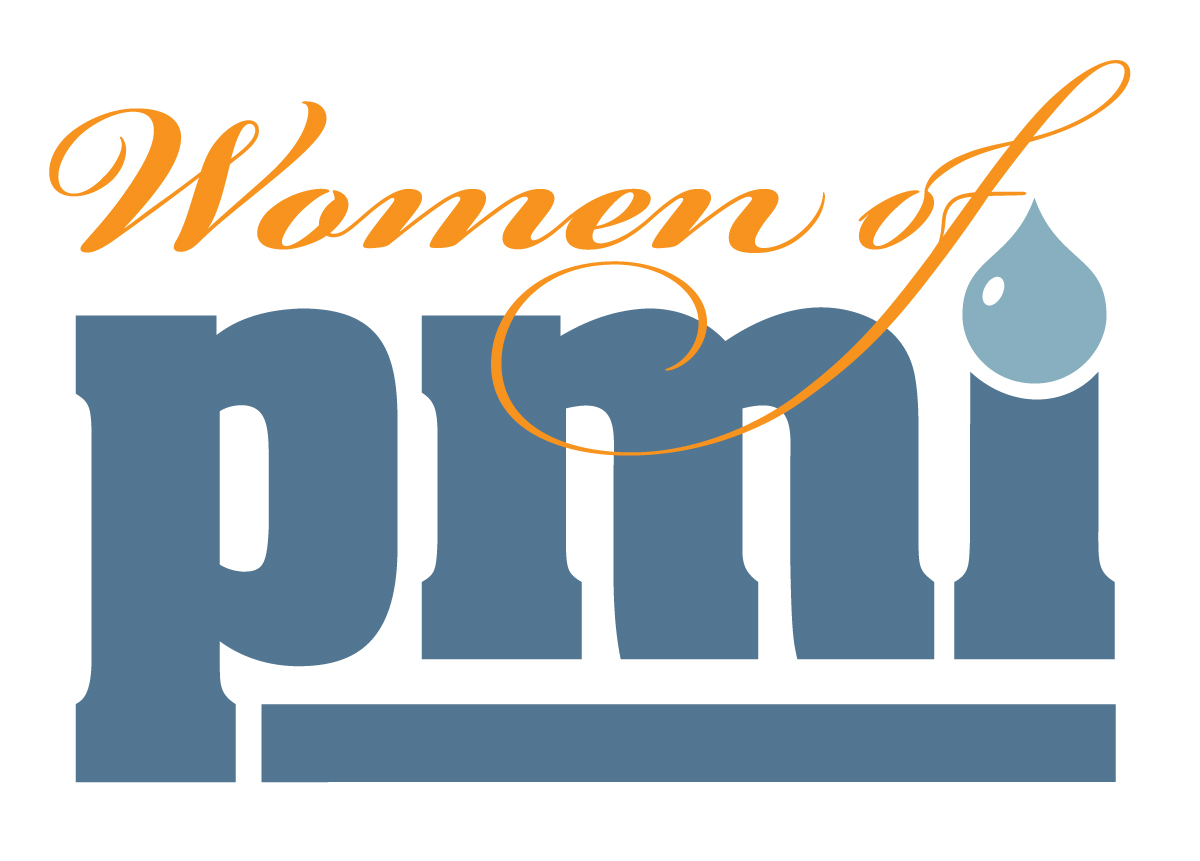 Within the last few years, women have been placed in top leadership positions at PMI member companies or PMI, including Jill Ehnes, president, Delta Faucet Company and PMI Strategic Advisory Council member; Carmen Fiordirosa, president, Gerber Plumbing Fixtures; Marki Huston, CEO, Viega North America; Eva-Marie Fox, president and COO, T&S Brass; Amy McCabe, president and CEO of Dornbracht America; Kate Olinger, director of industry and regulatory affairs at GF Building Flow Solutions (Uponor) and PMI board member; Paige Riddle, senior director, product management at LSP Products and PMI board member; Rachel Roberts, president, Moen and House of Rohl; Caroline Schmitt, CEO, Dornbracht; Alana Stevens, CEO, BLANCO North America; and Belinda Wise, Neoperl US board member and PMI board president.
Within the last few years, women have been placed in top leadership positions at PMI member companies or PMI, including Jill Ehnes, president, Delta Faucet Company and PMI Strategic Advisory Council member; Carmen Fiordirosa, president, Gerber Plumbing Fixtures; Marki Huston, CEO, Viega North America; Eva-Marie Fox, president and COO, T&S Brass; Amy McCabe, president and CEO of Dornbracht America; Kate Olinger, director of industry and regulatory affairs at GF Building Flow Solutions (Uponor) and PMI board member; Paige Riddle, senior director, product management at LSP Products and PMI board member; Rachel Roberts, president, Moen and House of Rohl; Caroline Schmitt, CEO, Dornbracht; Alana Stevens, CEO, BLANCO North America; and Belinda Wise, Neoperl US board member and PMI board president.
Men recently joining these women in top management positions include Nik Bafana, senior vice president and leader, LIXIL Americas; John Belcik, CEO, International Code Council; David A. Tompos, executive vice president, ICC Conformity Assessment Group; Jonathon Nudi, president and CEO, Masco Corporation (effective July 7, 2025), the parent company of BrassCraft, Delta Faucet Company and Hansgrohe; John Reutter, president, GF Building Flow Solutions Americas (Uponor); and Jeff Schoon, president, Zurn Elkay Water Solutions.
Other women of PMI receiving recognition recently include Hailey Mick of GF Building Flow Solutions (Uponor) and Mary Phelps of Sloan, who were named among Plumbing & Mechanical Contractor’s “10 Influential PHCP-PVF Women,” and UL Solutions’ CEO Jennifer Scanlon, who was included on the National Safety Council’s “CEOs Who Get It” list and received YMCA Chicago’s Outstanding Leader in Business Award.
In honor of these and many other accomplishments, PMI launched its Women of PMI initiative, which features virtual programs and an annual breakfast at the PMI Manufacturing Success Conference, as well as a web page containing news and articles of interest.
Providing opportunities for a broad spectrum of talents and capabilities
Stemming from their histories of family ownership, PMI member companies pride themselves on providing opportunities for people from a broad spectrum of talents and capabilities and who also live in the communities where the facilities are located. Chip Way, director of OEM sales at Lavelle Industries and immediate past president of the PMI Board of Directors, said the company draws most of its employees from communities near its Burlington, Wisconsin, headquarters. “We hire locally and provide opportunities to people in our small-town community. From hiring new high school and college graduates to individuals who may be facing a challenge or have a disability, all our employees are highly capable and motivated. Roles like assembly are critical to our success,” he explained. “Just as important, we believe in promoting from within. Many of our leaders started in entry-level positions and have grown into management roles. And that’s been part of our model for decades, and it continues to serve us well. And as a small company, the word family gets thrown around a lot, but it really is—it’s a family-owned and a family environment at Lavelle. And that’s how people are treated, and you want your family to grow, and that’s how it works at Lavelle.”
 Bradley Company contributed to opportunities for the women of tomorrow by providing financial support and mentorship to the Galentine’s Women in S.T.E.M. event, hosted by the Hartford Union High School’s Robotics Team. The event provided an interactive and inspiring platform for female students in grades 7-12 to discuss opportunities in science, technology, engineering and mathematics.
Bradley Company contributed to opportunities for the women of tomorrow by providing financial support and mentorship to the Galentine’s Women in S.T.E.M. event, hosted by the Hartford Union High School’s Robotics Team. The event provided an interactive and inspiring platform for female students in grades 7-12 to discuss opportunities in science, technology, engineering and mathematics.
PMI continues to offer its members ways to grow, learn and add to their experiences. To be held Nov. 3-6, 2025, in Chicago, the annual PMI Manufacturing Success Conference brings employees of PMI member companies the latest insights on issues and trends affecting the plumbing manufacturing industry, featuring inspiring speakers and a variety of presentations, as well as opportunities to network and collaborate with industry colleagues. The PMI Inspiring Leaders Program, held on the first day of the conference, cultivates creative, leadership and team-building skills. Associated workshops held throughout the year addressed topics including communications that drive employee engagement and retention, P&L statement proficiency, and virtual leadership presence.

Innovation extends from product design to sustainability, cybersecurity and more
Innovation has always been an integral part of plumbing manufacturing. Each year, the kitchen and bath industry recognizes outstanding product innovation and design. This year, Kohler won four Best of Kitchen and Bath Industry Show (KBIS) product awards—“Wellness Trailblazer” Gold Award for Kohler x Remedy Place Ice Bath; “Sustainable Standout” Gold Award for Landshapes Tile by Kohler WasteLAB x Daniel Arsham; “Style Statement: Kitchen” Silver Award for the Billet Kitchen Faucet Collection; and “Style Statement: Bath” Silver Award for the Guise Collection by Kallista, a Kohler brand. Kohler also won Best of Show Booth Design for the third straight year.
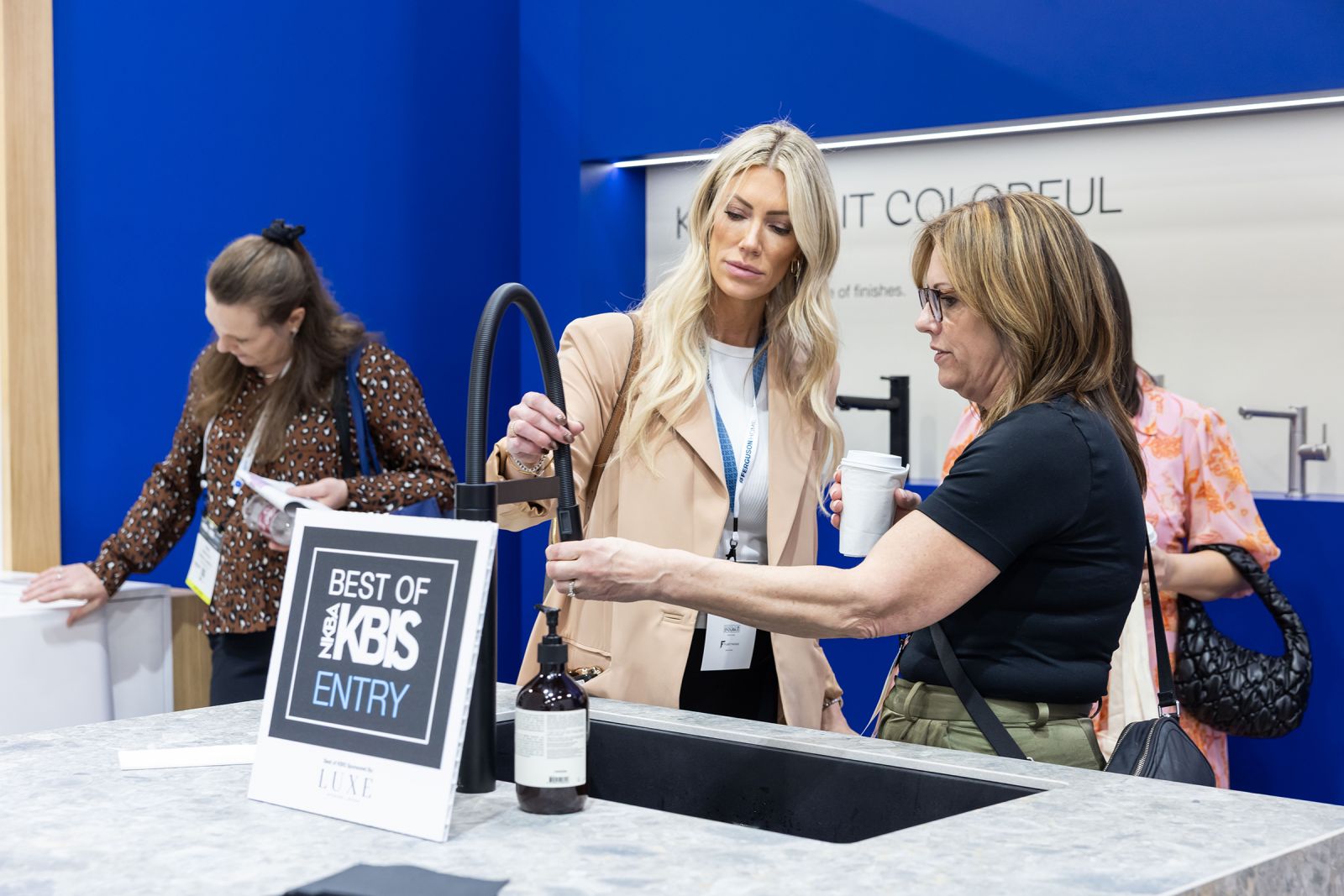
Other PMI members were recognized for their outstanding work, as well. BLANCO, Elkay and House of Rohl were Best of KBIS finalists in the “Style Statement: Kitchen” category; Delta Faucet Company was a finalist in the “Most Functional Find” category; and Elkay and Laufen Bathrooms were finalists in the “Wellness Trailblazer” category. Moen was among 11 brands competing in KBIS Design Bites for the title of “Brand with the Biggest Bite.”
Bradley Company’s Elvari Washroom Accessories Collection and Duravit’s Qatego bathroom range received GOOD DESIGN Awards, an international recognition presented by the Chicago Athenaeum: Museum of Architecture and Design in cooperation with the European Centre for Architecture Art Design and Urban Studies. Pfister Faucets was honored with six platinum Awards for Design Excellence for their innovative, stylish, and high-quality faucets that elevate the design of any space, testifying to the company’s ongoing dedication to excellence in both form and function.
At the forefront of sustainability
Kohler’s Casa Grande, Arizona, facility is located in a stressed watershed. At this location and others, Kohler engages with the community to tackle a concerning challenge. In Casa Grande, Kohler supported a multi-year project led by Bonneville Environmental Foundation, Arizona State University, and Bridgestone to convert high water use crops to low water use crops to alleviate water stress on the local aquifers. In Monterey, Mexico, the Kohler team is working to restore the watershed and increase clean water access; in Mexico City, they’re harvesting rainwater; and in India, they’re implementing a reverse osmosis water system that purifies water by filtering out contaminants. This work coupling water innovation with community engagement earned Kohler a Global Humanitarian Award from the National Association of Home Builders.
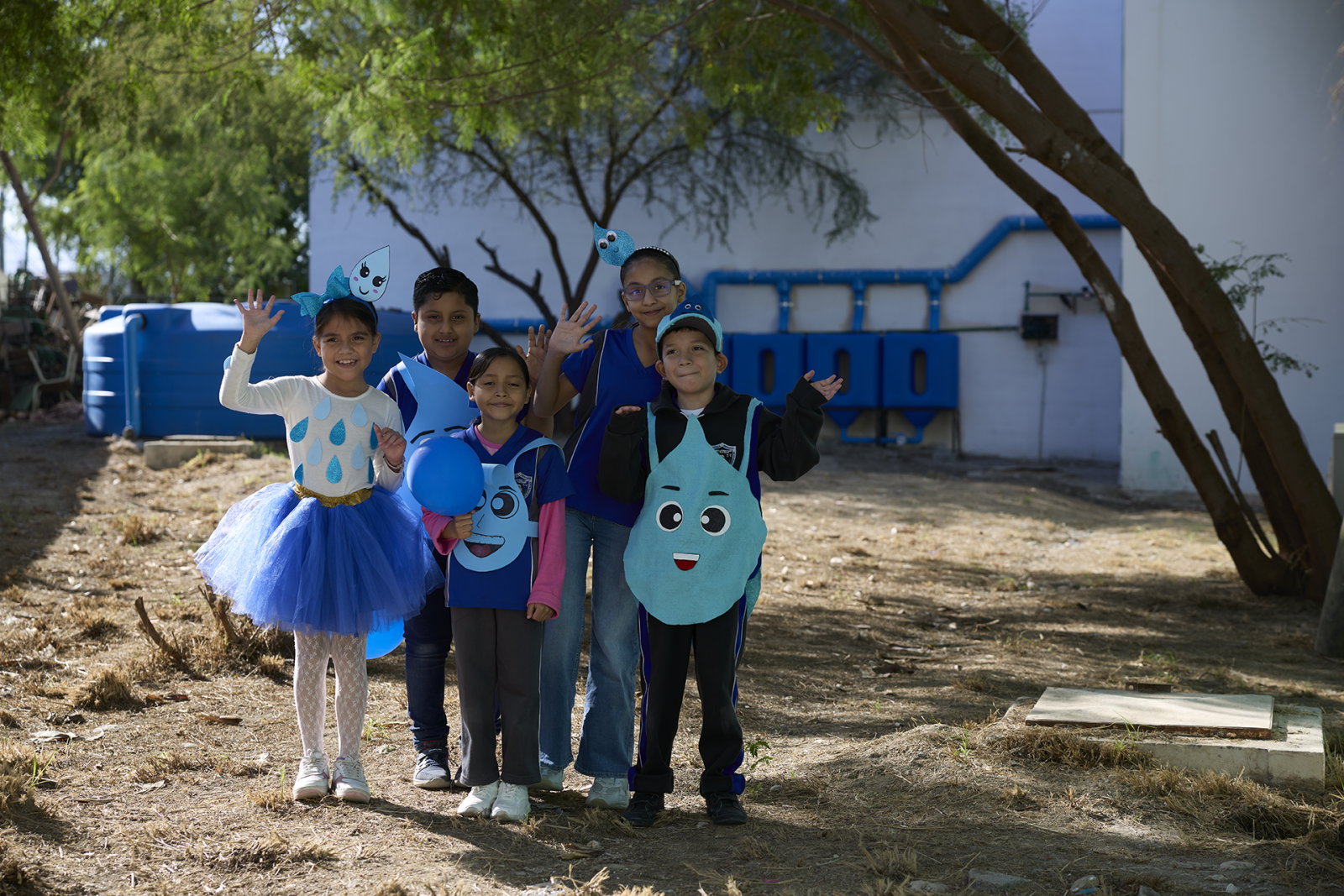
Neoperl co-owner Fabian Wildfang received the Rudolf Diesel Medal 2025 in the category “Most Sustainable Innovation Achievement.” The award recognizes Neoperl’s ongoing commitment to a greener future through sustainable innovation, as well as the water- and carbon emission-savings the company’s aerators and flow regulators provide. A 10-year study by the Technical University of Berlin showed that a Neoperl flow regulator in the shower saves 5 million times more water and 200,000 times more CO2 emissions than was required to manufacture it.
TOTO’s 2030 greenhouse gas reduction targets received the “1.5° C target” validation from the Science Based Targets initiative, placing the company’s goals in line with the Paris Agreement’s most ambitious benchmarks for limiting global temperature rise. In addition, the company has secured a spot on the Carbon Disclosure Project’s A List for outstanding environmental disclosure and performance. Toward achieving 100% renewable energy by 2040, TOTO has set goals to reduce CO2 emissions by 47.5% from its business sites and by 25% in product usage emissions by 2030.
As part of a parking lot expansion at its Franklin Park, Illinois, location, Sloan doubled the number of electric vehicle charging stations. The company’s Andover, Massachusetts, facility has achieved zero waste to landfill for two years. New air compressors installed in Sloan’s Arkansas foundry are more efficient and will help the company continue to reduce its Scope 3 emissions.
Leading the way on cybersecurity, innovation and research
UL Solutions was selected by the Federal Communications Commission to help lead the implementation of the new U.S. Cyber Trust Mark Program, which will equip qualifying smart products with a cybersecurity safety label. As the program’s lead administrator and cybersecurity label administrator, UL Solutions is responsible for identifying or developing the program standards and testing procedures to recommend to the FCC for approval. UL Solutions will support the FCC and other stakeholders in establishing the technical requirements and other details that will help launch and grow the program. The first of its kind for the U.S. government, the voluntary U.S. Cyber Trust Mark program is designed to help consumers make informed decisions about wireless, IoT products they bring into their homes, differentiate trustworthy products in the marketplace, and create incentives for manufacturers to meet cybersecurity standards.
IAPMO announced the launch of the IAPMO Innovation and Research Fund, an initiative designed to fuel pioneering research, develop innovative solutions, and launch impactful projects that address critical issues in the plumbing, water and mechanical industries. The fund aims to improve public health, strengthen climate resiliency, and increase housing affordability while contributing to a more sustainable future. The fund brings together industry, academia, philanthropic groups, and individuals committed to the belief that technological innovation holds the key to improving the quality of life in the communities where IAPMO’s employees live and work. Through collaboration and cutting-edge research, the fund will focus on three main areas: water and health, innovative new systems, and new tools.

Fulfilling public health and safety responsibilities often taken for granted
Say “public health and safety” to most people, and things like vaccinations, food safety, and emergency warnings and services will likely come to mind. PMI and its members, however, are well aware of the important role they play in providing the public health and safety services of sanitation, hygiene and housing—services that often are taken for granted.
Way said it best. “The connection of our products to health and safety is hidden in the silence of producing a good product that lasts a long time,” he explained. “By putting in the work up front to make an efficient, well-functioning, long-life product, you create health and safety silently in the background.”
Assisting communities and populations in need
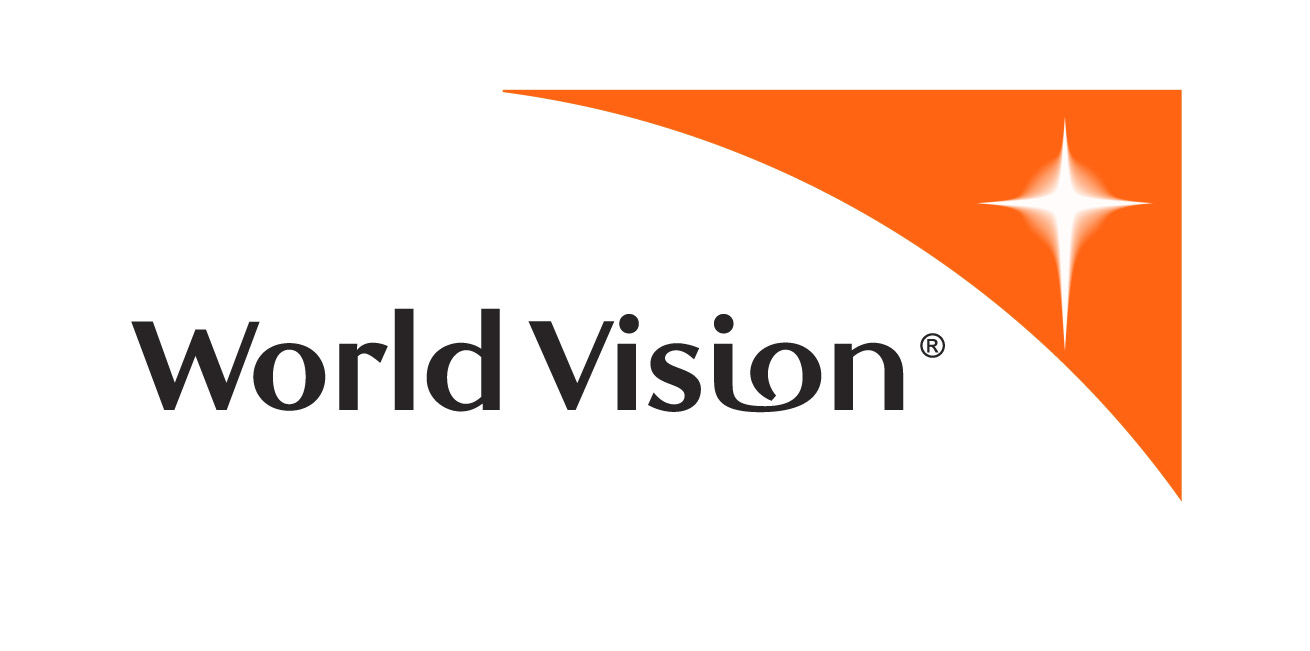 PMI and members including Gerber Plumbing Fixtures, Kohler, LIXIL and Reliance Worldwide Corporation have supported the Storehouse of World Vision through sponsorship of the annual Crystal Vision Awards. The storehouse collects and distributes excess inventory gathered from building industry manufacturers, retailers, distributors and others to families in need. The most recent annual event featured a video showing how storehouse building materials, including bathroom and kitchen faucets, were used to help rebuild Asheville, North Carolina, after Hurricane Helene. The Wholesaler Magazine, to which PMI regularly contributes articles, won the Partnership Award this year for its commitment to advancing the plumbing, heating, cooling, and PVF industries and giving back to the communities they serve.
PMI and members including Gerber Plumbing Fixtures, Kohler, LIXIL and Reliance Worldwide Corporation have supported the Storehouse of World Vision through sponsorship of the annual Crystal Vision Awards. The storehouse collects and distributes excess inventory gathered from building industry manufacturers, retailers, distributors and others to families in need. The most recent annual event featured a video showing how storehouse building materials, including bathroom and kitchen faucets, were used to help rebuild Asheville, North Carolina, after Hurricane Helene. The Wholesaler Magazine, to which PMI regularly contributes articles, won the Partnership Award this year for its commitment to advancing the plumbing, heating, cooling, and PVF industries and giving back to the communities they serve.
In response to the devastating wildfires that affected Los Angeles County, ICC Evaluation Service is supporting the community’s rebuilding efforts with specialized certification programs and services. These initiatives aim to help manufacturers and city officials streamline approvals and meet critical rebuilding timelines. With decades of expertise in product certification and a long-standing relationship with the Los Angeles Department of Building and Safety, ICC-ES is uniquely positioned to support the community in its recovery.
Reliance Worldwide Corporation assisted the global non-profit Wine To Water to bring water to isolated communities in Nepal and to provide relief response in natural disaster and conflict areas. RWC’s support involves fundraising, assembling water filters, and providing expertise, equipment and volunteers to projects in the field.
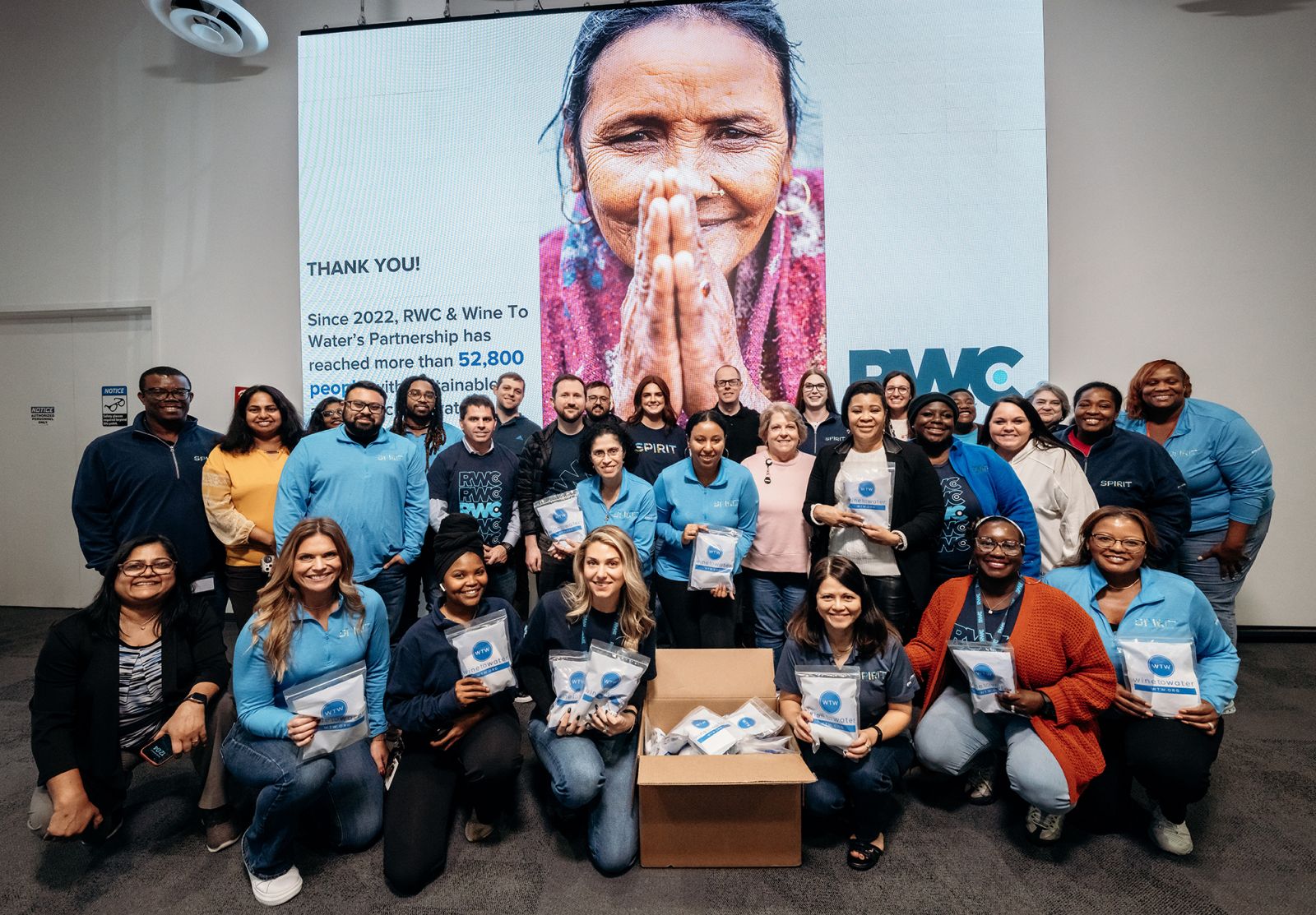
Kohler opened a permanent shower trailer in Huntsville, Alabama, to provide showers and hygiene products to the unhoused and underserved populations. With seven suites and one ADA unit, the trailer is located at the Rose of Sharon mission and was developed in a partnership between local Kohler employees and the ShowerUp non-profit organization.
Preventing accidents and mitigating harm
Symmons Industries celebrated company inventions that, to this day, prevent scalding in showers. In 1939, company founder Paul Symmons invented the pressure-balancing shower valve, a game-changer that ensured water temperature stayed consistent when someone flushed a toilet or ran a faucet in another room. Fast forward to 1968, and Symmons introduced another hit: the Temptrol valve. Think of it as the ultimate upgrade to that original pressure-balancing valve. Durable, dependable and easy to maintain, Temptrol became a staple in homes, hotels and commercial buildings across the country—and it’s still going strong today.
T&S Brass reached 6 million hours worked without a lost-time accident. This milestone demonstrates the company’s ongoing dedication to workplace safety and its commitment to protecting the well-being of its employees. Comprehensive safety measures, continuous employee training, and a focus on fostering a safe working environment contributed to the achievement. T&S has implemented robust safety programs that include regular assessments, on-the-job training, and an open-door policy for employees to raise safety concerns.
Safety showers and eye wash stations produced by Haws, mSupply’s safety plumbing brand Speakman, and other manufacturers rapidly wash hazardous substances away from the body or eyes after accidental exposures.
Celebrating its 50th year in operation, the BrassCraft Lancaster facility has achieved an outstanding safety record with only one lost-time injury over the past eight years. Since opening, the facility has manufactured half a billion water stops, serving over 50 million homes.
Promoting health and safety
NSF celebrated the 50th anniversary of the Safe Drinking Water Act, which led to the development of NSF/ANSI/CAN 60: Drinking Water Chemicals—Health Effects and NSF/ANSI/CAN 61—Drinking Water System Components standards to protect drinking water against natural and human-made contaminants. This anniversary marks a significant milestone in the improvement of health and water safety across the U.S. and recognizes the commitment of the SDWA and NSF in delivering clean and safe drinking water to communities nationwide.
NSF announced a new service for products certified to NSF/ANSI/CAN 61 to demonstrate their compliance with the most current PFAS requirements in the standard. Products that have been demonstrated not to extract PFAS compounds above the health-based criteria in NSF/ANSI/CAN 600 will be eligible to use a special product mark that indicates this compliance “+ PFAS Tested.” NSF also celebrated the 60th anniversary of NSF/ANSI 14: Plastics Piping System Components and Related Materials.
PMI members produce a range of products promoting health, safety and wellbeing. For example, Fluidmaster toilet bowl disinfectants and bidets improve hygiene and personal comfort while reducing toilet paper consumption.
“Everything we do ultimately leads back to our vision of safe, responsible plumbing—always,” Stackpole said. “PMI always endeavors to find the common ground that balances the concerns of all stakeholders, whether that’s in relation to trade policy, water management, workplace issues, sustainability, or public health and safety. We have found that the best solutions, the ones that stand the test of time, have broad support.”

PMI Committee Co-Chairs
Advocacy/Government Affairs
Co-Chairs: Mike Johnson, Delta Faucet Company, and Martin Knieps, Viega
Technical
Co-Chairs: C.J. Lagan, LIXIL, and Will Wang, Fluidmaster
2025 PMI Board of Directors
Belinda Wise, President
Neoperl US
Bob Neff, Vice President
Delta Faucet Company
Lowell Lampen, Secretary-Treasurer
Kohler
Chip Way, Immediate Past President
Lavelle Industries
Troy Benavidez, LIXIL
Kate Olinger, GF Building Flow Solutions (Uponor)
Michael Reffner, Moen
Paige Riddle, LSP Products
Strategic Advisory Council
Robert Downie, Duravit
Jill Ehnes, Delta Faucet Company
Shawn Oldenhoff, Kohler
William Strang, TOTO USA
Todd Teter, Council Chair
Claude Theisen, T&S Brass
PMI Staff
Kerry Stackpole, FASAE, CAE, CEO/Executive Director
Jodi Stuhrberg, Director of Programs and Administration
Kyle Thompson, Technical Director
Matthew Windrum, Director of State Government Affairs, Policy and Advocacy
Merill Morse, Programs and Events Coordinator
Ann Geier, Administrative Assistant
